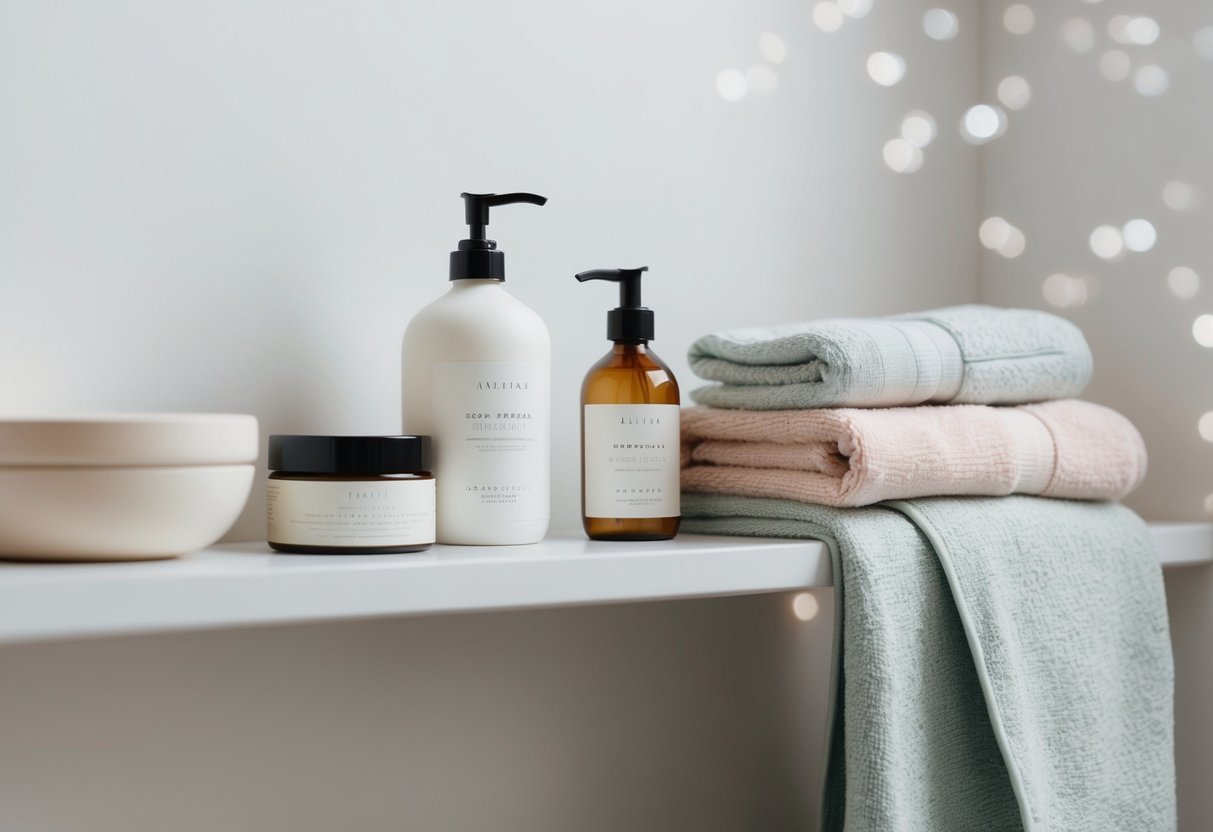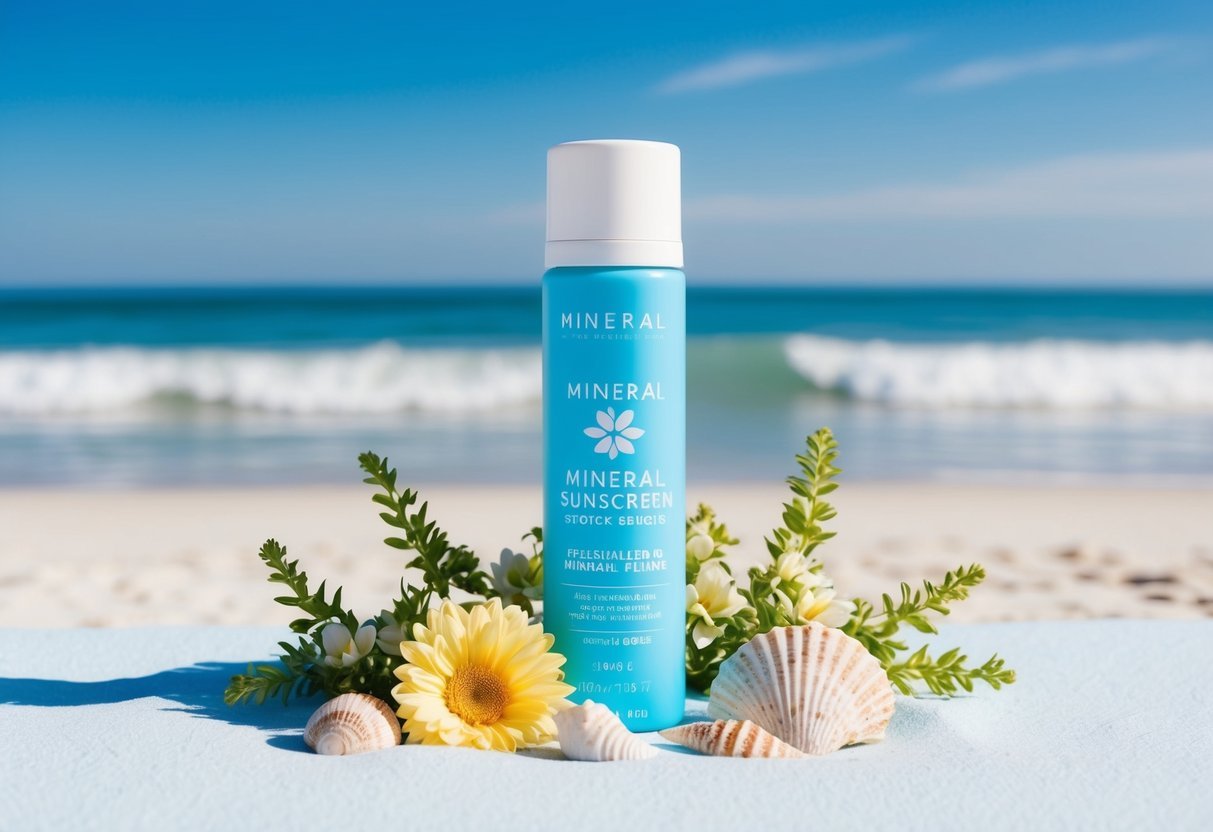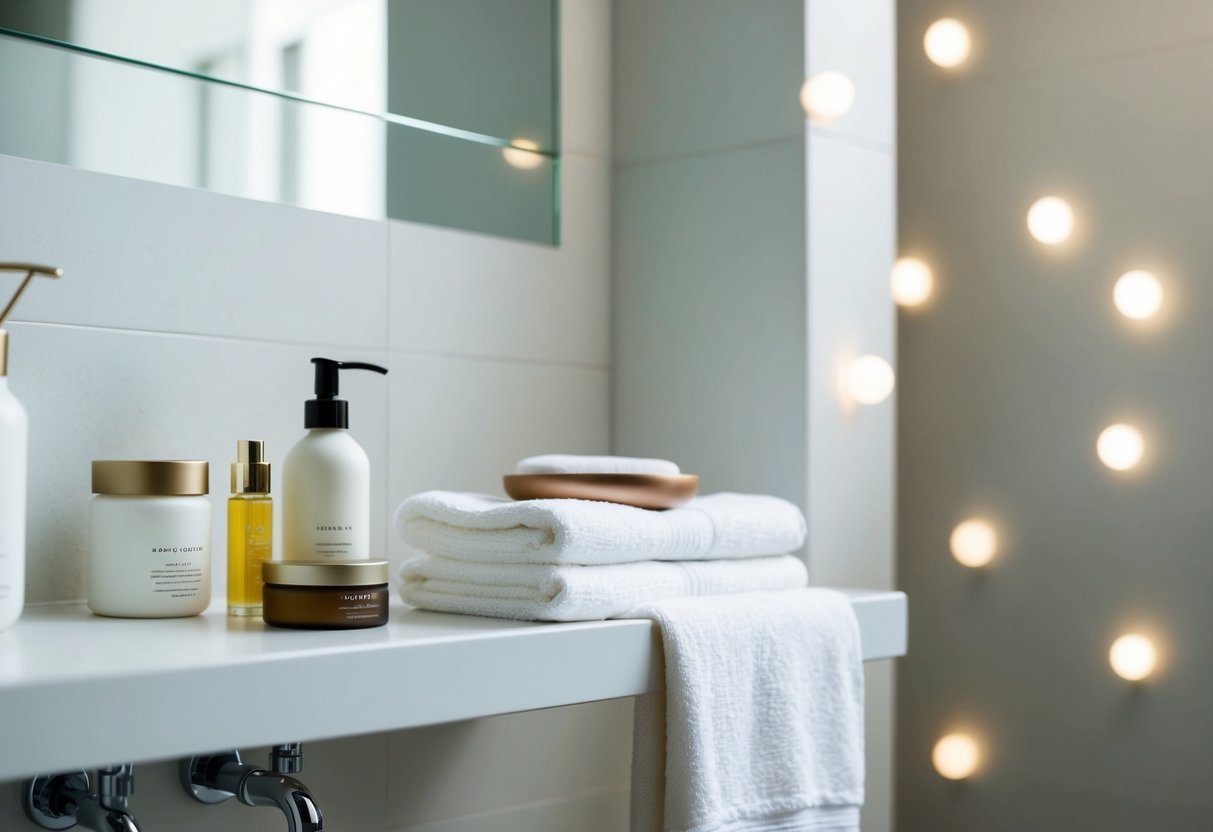Sensitive skin can make beauty routines a real challenge. Many of us struggle with redness, irritation, and breakouts caused by harsh ingredients or environmental factors. That’s where clean beauty comes in. Using pure, natural products can help soothe and protect delicate complexions.

We’ve put together some helpful tips for managing sensitive skin with a clean beauty approach. By opting for gentle, organic formulas and being mindful of potential irritants, it’s possible to care for reactive skin types without compromising on results. With the right products and techniques, even the most sensitive skin can look and feel its best.
1) Avoid Fragrances
When it comes to sensitive skin, fragrances can be a major irritant. We recommend steering clear of products with added scents, even if they claim to be natural or derived from essential oils.
Instead, opt for fragrance-free options in your skincare routine. These products are less likely to cause reactions or flare-ups on delicate skin. Additionally, you can enhance your skincare regimen by incorporating soothing ingredients like aloe vera and chamomile, which are known for their calming properties. Always patch-test new products to ensure they won’t irritate your skin. For more advice on selecting the right products, be sure to check out our fragrancefree beauty product tips to help you make informed choices.
Many clean beauty brands now offer unscented versions of their popular items. Look for labels that say “fragrance-free” or “unscented” when shopping for cleansers, moisturizers, and serums.
Remember, even natural fragrances can be problematic for sensitive skin. It’s best to choose products with minimal ingredients and no added perfumes.
If you miss having a pleasant scent in your routine, try using a separate fragrance-free lotion and adding a drop of your favorite essential oil. This way, you can control the amount and avoid applying it directly to your face.
2) Patch Testing
We always recommend patch testing new clean beauty products before applying them to your face. It’s a simple but crucial step for those of us with sensitive skin.
To patch test, we apply a small amount of the product to our inner forearm or behind our ear. These spots are discreet and less likely to get washed off accidentally.
We leave the product on for 24-48 hours, watching for any signs of irritation like redness, itching, or swelling. If our skin reacts, we know to avoid that product.
For leave-on products like serums or moisturizers, we apply a thin layer. With rinse-off items like cleansers, we create a small lather, apply it, and rinse after a few minutes.
Patch testing helps us find gentle, non-irritating clean beauty options that work for our unique skin. It’s an easy way to avoid potential flare-ups and discover products we can trust.
3) Hydration is Key

Keeping sensitive skin well-hydrated is crucial for maintaining its health and resilience. We’ve found that proper hydration can help prevent common issues like redness, itching, and irritation.
For our sensitive-skinned friends, we recommend using clean, organic moisturizers packed with nourishing ingredients. Look for products containing hyaluronic acid, a superstar hydrator that’s gentle on reactive skin.
We love barrier-supporting ingredients too. These help lock in moisture and protect your delicate skin from environmental stressors. Natural options like shea butter or jojoba oil can work wonders.
Don’t forget to hydrate from the inside out! Drinking plenty of water throughout the day supports your skin’s moisture levels. We also suggest incorporating hydrating foods into your diet, like cucumber and watermelon.
For an extra boost, try using a clean, alcohol-free facial mist. It’s a refreshing way to add a quick hit of hydration whenever your skin feels parched.
Remember, consistency is key. Make hydration a non-negotiable part of your daily skincare routine. Your sensitive skin will thank you with a calmer, more radiant complexion.
4) Choose Mineral Sunscreen

Mineral sunscreens are a fantastic option for those of us with sensitive skin. Unlike chemical sunscreens, they sit on top of the skin and reflect harmful UV rays.
We love that mineral sunscreens often contain natural ingredients like zinc oxide and titanium dioxide. These gentle formulas are less likely to cause irritation or breakouts.
When shopping for mineral sunscreen, we look for options that are fragrance-free and moisturizing. This helps prevent dryness and keeps our skin feeling comfortable all day long.
Many clean beauty brands now offer mineral sunscreens that blend seamlessly into the skin. Gone are the days of chalky white residue – these formulas are lightweight and easy to apply.
For extra sensitive skin, we recommend trying a tinted mineral sunscreen. The slight tint can help even out skin tone while providing sun protection.
Don’t forget to reapply your mineral sunscreen every two hours, especially if you’re swimming or sweating. With these pure and natural options, we can keep our skin protected without harsh chemicals.
5) Gentle Cleansing

Cleansing is a crucial step for those of us with sensitive skin. We need to be extra careful about what we put on our faces.
Look for cleansers that are soap-free, fragrance-free, and made with natural ingredients. These tend to be less irritating and more nourishing for delicate complexions.
We love cleansing balms and oils that melt away makeup without stripping the skin. They’re often packed with soothing botanicals that leave our faces feeling soft and calm.
For morning cleansing, a lightweight gel or cream cleanser can do the trick. Opt for formulas with ingredients like chamomile, aloe vera, or oat extract to calm and hydrate.
Remember to use lukewarm water when washing your face. Hot water can be too harsh and dry out sensitive skin.
Pat your skin dry gently with a soft towel instead of rubbing. This helps preserve your skin’s natural oils and prevents irritation.
Consider double cleansing at night if you wear makeup or sunscreen. Start with an oil-based cleanser, then follow up with a gentle water-based one for a thorough yet kind cleanse.
6) Moisture Barrier Support

Supporting our skin’s moisture barrier is crucial for managing sensitive skin. This protective layer helps lock in hydration and shield against irritants. When it’s compromised, we’re more prone to dryness, redness, and irritation.
Clean beauty offers gentle options to nurture our barrier. We love using facial oils rich in omega fatty acids, like jojoba or rosehip. These natural gems mimic our skin’s own oils, helping to reinforce its defenses.
Ceramide-packed moisturizers are another skin-saving ally. These lipids are like the mortar between our skin cells, keeping everything strong and supple. Look for formulas with plant-derived ceramides for a clean beauty boost.
Don’t forget about hydrating serums! Ingredients like hyaluronic acid and glycerin draw moisture into our skin, plumping it up from within. We opt for clean versions free from synthetic fragrances or dyes.
Gentle cleansing is key too. We choose sulfate-free, pH-balanced face washes that won’t strip our skin’s natural oils. Cream or oil cleansers are especially soothing for sensitive types.
Understanding Sensitive Skin

Sensitive skin reacts more easily to external factors and products. It often feels uncomfortable and can be challenging to care for. Let’s explore what triggers sensitivity and how to recognize it.
Common Triggers
We’ve found that several factors can set off sensitive skin reactions. Environmental elements like harsh weather, pollution, and UV rays are frequent culprits. Many of us also react to certain skincare ingredients, especially fragrances and alcohol-based products.
Stress plays a big role too. When we’re feeling frazzled, our skin tends to act up. Hot showers are another sneaky trigger – they feel great but can strip our skin’s natural oils.
Genetics matter as well. If our parents have sensitive skin, chances are we might too. It’s all part of our unique skin makeup.
Signs of Sensitive Skin
Recognizing sensitive skin isn’t always straightforward. We might experience redness, itching, or a burning sensation after using certain products. Our skin might feel tight or dry, even when we moisturize regularly.
Breakouts can be a sign too, especially if they pop up after trying new skincare items. Some of us notice our skin becomes easily flushed or develops rashes.
It’s important to pay attention to how our skin reacts to different situations. If we’re constantly battling irritation or discomfort, it’s likely we’re dealing with sensitive skin.
Remember, these symptoms can vary from person to person. What bugs one of us might be fine for another. That’s why finding the right clean, gentle products is key for happy, healthy skin.
Choosing Clean Beauty Products

Navigating the world of clean beauty can be tricky, but we’ve got you covered. Let’s explore how to select products that are gentle on sensitive skin and free from harsh chemicals.
Reading Labels and Ingredients
We always start by scrutinizing product labels. Look for short ingredient lists with recognizable names. Natural oils, plant extracts, and minerals are our go-to components. Avoid products containing parabens, sulfates, and synthetic fragrances.
Keep an eye out for certifications like USDA Organic or EWG Verified. These labels indicate stricter standards for ingredient safety and transparency.
We love ingredients like aloe vera, jojoba oil, and chamomile for their soothing properties. Vitamin E and green tea extract are fantastic antioxidants that protect sensitive skin.
Hypoallergenic and Fragrance-Free Options
For ultra-sensitive skin, we swear by hypoallergenic and fragrance-free products. These gems are less likely to trigger reactions or irritation.
Opt for mineral-based sunscreens with zinc oxide or titanium dioxide. They’re gentler on skin compared to chemical sunscreens.
We’re big fans of brands that offer sample sizes. This way, you can patch test products before committing to full-size versions.
Remember, “fragrance-free” doesn’t always mean unscented. Some products use natural essential oils for a light, non-irritating scent.
Look for moisturizers with ceramides and hyaluronic acid. These ingredients help strengthen the skin barrier and lock in hydration without causing irritation.
Frequently Asked Questions

Managing sensitive skin can be tricky, but with the right approach, it’s totally doable. Let’s dive into some common questions about caring for delicate skin and explore clean beauty solutions.
What are the best practices for a sensitive skin care regimen at home?
We recommend keeping it simple. Stick to gentle, fragrance-free products and avoid harsh exfoliants. Always patch test new items before full use.
Hydration is crucial, so look for moisturizers with soothing ingredients like aloe or chamomile. Don’t forget to apply a mineral-based sunscreen daily to protect your skin.
How can I establish an affordable skin care routine suitable for sensitive skin?
Building a budget-friendly routine is easier than you might think. Start with a mild cleanser and a basic moisturizer.
Look for multi-tasking products to cut costs. We love ingredients like glycerin and hyaluronic acid, which are often wallet-friendly yet effective. DIY masks with oatmeal or honey can be a cheap and gentle treat for your skin.
What cleansers are recommended for people with sensitive skin?
We’re fans of cream or lotion cleansers for sensitive skin. These are usually gentler than foaming options.
Look for products with minimal ingredients and no added fragrances. Micellar water can be a great option for makeup removal. Remember, lukewarm water is best – hot water can strip your skin of its natural oils.
Can you suggest some dermatologist-approved products for managing sensitive skin?
While we can’t name specific brands, we can point you in the right direction. Look for products labeled “hypoallergenic” or “for sensitive skin.”
Zinc oxide sunscreens, fragrance-free moisturizers, and cleansers with ceramides are often recommended by derms. Always check with your own dermatologist for personalized advice.
What steps should I include in my daily sensitive skin care routine?
Start your day with a gentle cleanse, followed by a light, hydrating moisturizer. Apply your mineral sunscreen as the final step.
At night, double cleanse if you wear makeup, then use a richer night cream. Once or twice a week, you might add a hydrating mask. Remember, less is often more with sensitive skin.
What natural methods are effective for caring for sensitive skin?
We love natural solutions for sensitive skin. Oatmeal baths can be super soothing. Aloe vera gel straight from the plant is awesome for calming irritation. Meanwhile, cold compresses with green tea can reduce redness. For moisturizing, pure oils like jojoba or argan can be great. Just remember, natural doesn’t always mean gentle, so still patch test!

